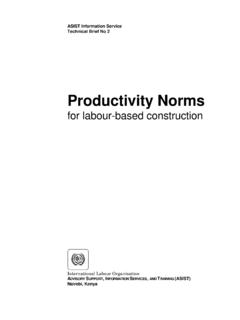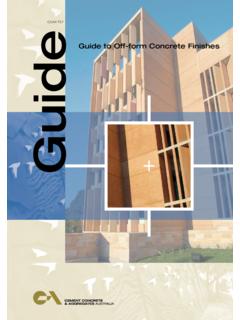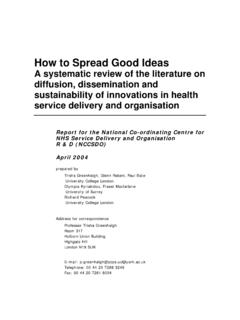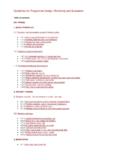Transcription of Inter-project learning: processes and outcomes of ...
1 Research Policy 30 (2001) 1373 1394 Inter-project learning : processes and outcomes of knowledgecodification in project - based firmsAndrea Prencipea, , Fredrik TellbaCoPS Innovation Centre, SPRU, University of Sussex, Mantell Building, Falmer, Brighton BN1 9RF, UKbDepartment of Management and Economics, Link ping University, SE-58183 Link ping, SwedenAbstractIn this paper, we argue that the literature on knowledge codification has been overly concerned with the economic propertiesof its outcomes , neglecting the importance of its underlying learning processes . Following Zollo and Winter [OrganisationScience, 2001, in press], the paper distinguishes three learning processes : experience accumulation, knowledge articulationand knowledge codification and suggests a framework to analyse the learning abilities of project - based firms. We proposethat mechanisms for Inter-project learning draw upon these learning processes and can be found at various levels of theproject- based firm.
2 Using empirical evidence from six case studies, we discern three empirical patterns, that we definedlearning landscapes, of such mechanisms. Implications for the literature and practice of knowledge codification are discussed. 2001 Elsevier Science All rights : project - based firm; Organisational learning ; Firm; Codified knowledge1. IntroductionThe literature on the knowledge - based theoryof the firm suggests that the capabilities of a firmare learning - based (Grant, 1996; Lazonick andO Sullivan, 1996; Dosi et al., 2000). Accordingly,the core activities of the firm, what the firm choosesto produce and sell, as well as the boundaries ofthe firm, are determined by the knowledge a firmpossesses. As observed by Levitt and March (1988), learning in the firm tends to be local. Interpretationof experience is difficult, as lessons must be drawnfrom a relatively small number of observations in acomplex and changing environment.
3 This makes itlaborious to identify causality and draw correct in- Corresponding author. Tel.:+44-1273-678936;fax:+ (A. (F. Tell).ferences. Organisations and organisational membersexhibit systematic biases in interpretation, since theyconcentrate overwhelmingly on recent and salientevents. Also, they may be insensitive to sample size,attribute too much importance to intentionality, andmay use simple and linear aim of this paper is to discuss the learning abili-ties of project - based firms. We study whether and howproject- based firms are able to capitalise on knowledgethat is acquired during the execution of one project andtheir ability to transfer it to other projects or parts of theorganisation. In its ideal form, the project - based firmis organised solely around projects. Galbraith (1969)suggested that there is a continuum of organisationalforms ranging from the pure functional form throughthe matrix form to the pure product- or project -basedform.)
4 While in the functional form, a firm s businessactivities are organised according to functional spe-cialisation ( marketing, R in the matrix formthese activities are organised both within projects and0048-7333/01/$ see front matter 2001 Elsevier Science All rights :S0048-7333(01)00157-31374A. Prencipe, F. Tell / Research Policy 30 (2001) 1373 1394along functional lines. Within a pure project -basedfirm, projects embody most, if not all, of the businessfunctions normally carried out within departments offunctional or matrix organisations and act as the mainmechanisms for co-ordinating and integrating them(Hobday, 2000, p. 874). The project - based form has,for instance, been studied in consultancy and mar-keting firms (Alvesson, 1995), the film industry (De-Fillippi and Arthur, 1998), in architectural practice(Winch and Schneider, 1993), and construction firms(Gann and Salter, 1998).)
5 The project - based firm can also be found in the pro-duction of so-called complex product systems (CoPS)industries (Davies and Brady, 2000; Hobday, 1998,2000; Prencipe, 2000). CoPS are capital-, engineering-and IT-intensive, business-to-business products, net-works, constructs and systems. They are often pro-duced in multi-firm alliances, as a one-off or in smallcustomised batches for specific customers and mar-kets. Examples include global business networks, air-craft engines, civil airliners, power stations, off-shoreoil platforms, mobile telephone systems and large civilengineering projects. The focus of this paper is on thiscategory of strong focus on projects displayed by firms de-veloping CoPS suggests that there might be problemsassociated with organisation-wide learning (Lind-kvist et al., 1998). While in a functionally-basedfirm, departments act as knowledge silos, the pureproject- based firms lack the organisational mech-anisms for the knowledge acquired in one projectto be transferred and used by other projects.
6 Twofurther issues impair organisation-wide learning inproject- based firms: the unique and the temporarynature of projects (Brusoni et al., 1998). With re-gard to the former, projects differ from each other inseveral, critical aspects. They entail heterogeneousactivities that may well not be repeated in successiveprojects. If projects exhibit one-off characteristics,the project - based firm confronts the difficult task of learning from samples of one or fewer (March etal., 1991). In addition, projects may be characterisedby relatively long life cycles, requiring similar projectactivities to be retrieved and repeated after long timeintervals. With regard to the temporary nature ofprojects, projects can be characterised by the tem-porary constellation of people they entail (DeFillippiand Arthur, 1998; Tell and S derlund, 2001). Thisfeature implies that new human encounters and rela-tionships take place whenever a new project is started,which may increase the barriers to learning from theprevious experience of (2000) argued that project - based firms canbe regarded as apopulation of one puts on Darwinian spectacles and looks at theprojects portfolio of such firm, he will see popula-tions of entities (the single projects) that are born,die, compete for limited resources (skilled labour,equipment, and financial means), inherit clients,technologies and other traits from preceding gener-ations, and re-transmit them (sometimes modifiedor innovated) to next generations (Warglien, 2000,p.)
7 5). based on Warglien, we submit that projects canbe characterised byquasi-genetictraits (Cohen et al.,1996) that can be technological ( technologies,components) and organisational (reporting systems, project management). These quasi-genetic traits em-body the firm s capabilities and routines and can usu-ally be inherited from project to project , and they aresometimes modified by project development efforts (Warglien, 2000, p. 5). Following Davies and Brady(2000), who found that firms developing CoPS try toeconomise by the repetition of similar categories ofprojects, this paper analyses the mechanisms adoptedby project - based firms to make these quasi-genetictraits inheritable from project to otherwords, we look at how these firms are able to learnbetween build on the literature on knowledge manage-ment and, in particular, on the debate on knowledgecodification (Steinmueller, 2000).
8 It has been sug-gested that the ability to codify tacit knowledge car-ries some important implications for the efficiencyproperties of economic organisation. In fact, if knowl-edge can be codified and commodified, the ease ofknowledge transfer will increase and costs associatedwith such transfer will decrease (Cowan and Foray,1997). Given the features of a project - based firm1We are aware, however, of the limits of the biological pointed out by several authors ( Penrose, 1952), in organi-sations such as business firms, on the one hand there is no sexualreproduction, but on the other hand there is deliberate action Prencipe, F. Tell / Research Policy 30 (2001) 1373 13941375highlighted above, knowledge codification could haveprofound implications for organisation-wide the impact of codification for the efficiencyof organisational processes warrants further study, weargue that the debate on codification focuses mainly(and wrongly so) on the importance of theoutcomesof codification leaving the cognitiveprocessunderly-ing it unexplored.
9 We base the analytical frameworkof this paper on Zollo and Winter (2001) who em-phasised the relevance of theprocessdimension ofknowledge article is structured as follows. Section 2briefly introduces the debate on knowledge codifica-tion. based on Zollo and Winter (2001), Section 3suggests a simple model that outlines three learningprocesses that occur in the firm (experience accumu-lation, knowledge articulation, andknowledge codi-fication). We then identify the different mechanismsused by the project - based firms investigated in rela-tion to their Inter-project learning processes . Thesemechanisms are categorised intolearning landscapesof an ideal form (Section 4). We conclude the articleby discussing the implications for firm capabilitiesand the processes and outcomes of knowledge codifi-cation, as well as identifying future research A note on the codification debateIncreasingly, the nature and processes of organisa-tional knowledge have become the focus for theoristsin their attempts to delineate a viable theory of thefirm.
10 A number of definitions of organisational knowl-edge has been suggested in the literature (see, , 1997; Baumard, 1999; Eisenhardt and Santos,2001, for literature reviews). The aim of this sectionis to briefly introduce the literature on the reviewing current perspectives on knowledgecodification, we are going to employ two assump-tions. The first is that information and knowledge aretwo different concepts. Dosi et al. (1996) consideredinformation as well stated and codified propositionsabout (i) states-of-the-world ( it is raining ; (ii)properties of nature ( A causes B ); (iii) iden-tities of other agents ( I know Mr. X and he isa crook ) and (iv) explicit algorithms on how to dothings . knowledge is instead understood as includ-ing (i) cognitive categories; (ii) codes of interpreta-tions of the information itself; (iii) tacit skills and (iv)search and problem-solving heuristics irreducible towell-defined algorithms.)









